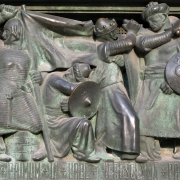Say’s Law Of Markets Writes The Code Of Moral Justice For We The Living.
When political force controls the economic decisions of daily life, a society decivilizes. Muscle cancels minds as the means for creating value, money diminishes as the tool for trading them, prices become perverted, and markets atrophy. In We the Living, Chapter 4, Alexander Argounov agrees to be paid in lard for his handkerchiefs, and in Chapter 5, tenants who are private traders are charged exorbitant rates for being bourgeois.
Arbitrarily condemned as exploiters, the entrepreneurial types integrate their mental with their physical energy, open businesses at Alexandrovsky market in order to survive, and quickly fail because consumers have no money. This downward spiral is a necessary consequence of Say’s Law, aka the law of markets – production creates its own demand. In 1920’s Petrograd, the mind has been neutered by the Revolution, material capital is depreciating quickly, financial capital exists only on the black market, and production has regressed to mindless, medieval standards.
The beginning of Chapter 9 continues, “Argounov’s Navy Soap was a failure. Galina Petrovna’s energy found their next business venture.” Her new patron had instructed, “Remember, eighty seven tablets is all you have to put into a box labeled ‘One Hundred.’ Great future in saccharine.” Galina then instructs, “Sorry, it’s too bad about your studies Kira, but you’ll just have to help. You have to eat, you know.”
Kira counted the little crystals in the palm of her hand. She tried not to breathe or swallow; when she did, the white powder, seeping through her lips and nostrils, bit her throat with the pain of a piercing, metallic sweetness.
For the benefit of us in 2020 America who can’t comprehend the horror of this, Doctor J explains to our Facebook forum,
The saccharine used back then to replace sugar, and only allowed for the Communist leadership, was rarely found even on the black market. To be found with it was instant death – it would have meant it was stolen from a high ranking official. A little trivia here!
Of course, Alexander and Galina’s daughter Kira is not an economist. Her chosen profession is another applied science – engineering. Yet the great Austrian economist Ludwig von Mises tells us, Economics is Life, and Kira is a lover of her life. Her ability to produce, particularly as a Gen Z female engineer in the 1920’s, required political and economic freedom.
When she meets the love of her life Leo, at the end of Chapter 9, he tells her, “Kira, I am going away, tonight. Forever. To Germany. I’m a fugitive Kira. A counter revolutionary.” She demands, “I’m going with you Leo.” Economic freedom.
Chapter 10 begins with the capture of Leo and Kira aboard a smuggler’s boat escaping the slavery of Soviet Russia. The cap of the Baltfleet sailor who held them in custody bore,“A five-pointed Soviet star. Kira, her eyes glued to the red star, the star that filled her eyes, but could not reach her brain, muttered foolishly, softly, as a child.”
Here, Ayn Rand has exposed to the reader to Kira’s subconscious reaction, which is similar to the fear she sensed when meeting Soviet enforcer Andrei for the second time in Chapter 5. Their first meeting was at the Student Council election a few days earlier. There, she overheard a Soviet speaker named Pavel tell a friend how Communism’s economic slavery would work,
It’s on the internal front that we have to dig our trenches. When our enemies fall, there is no blood, no cry. The world never knows when they were killed. Sometimes, they do not know it themselves.
The larger faction at the election meeting – the Whites who stood for the status quo against the Reds’ tyranny, closed with an old drinking song, ‘Days of Our Life,’ that was,
Born long before the Revolution in the stuffy rooms where they discussed philosophy, and with forced bravado drank cheap vodka to the futility of life. Kira frowned; she did not sing. She noticed the students in leather jackets and red kerchiefs kept silent too.
This was the malevolent universe of chaos and impotence that both Kira and the Communist minority at the election wanted to leave on the dust heap of history. By Chapter 11, millennial Leo had been freed, and with Gen Z’er Kira, had settled in to their new apartment, yet “She had never given much thought to the necessity of keeping alive. She found suddenly that the mere fact of keeping alive had grown into a complicated problem which required many hours of effort.” Home economics.
The only friendly face from the Argounov or Ivanovitch family homes was her cousin Irina, who shared Kira’s love of life. In Chapter 11,
They sat in the shadows and talked about Rembrandt, whom Irina was studying; and the new perfume Vava had received from a smuggler – real French perfume. Irina had cried smelling it.
Mind, body, and spirit as an integrated, human whole, as opposed to the treatment Kira received from her family after taking an apartment with Leo in Chapter 10,
How could you? Have you no conception of shame? Did you stop to think it was a mortal sin? And the Church . . . for centuries . . . all of our Saints have told us that no sin is lower! The Saints who, for our sins . . . Such women should not be allowed to live!”
This medieval mysticism was the disintegration of mind and body that Kira had rejected. It was also the status quo that the Whites, at the election meeting, wanted to preserve. Kira was not political, her life’s goals depended on the economic way of Say’s Law, and its life premise of reason, purpose, and pride.
Starving, Kira and Leo ventured to Petrograd’s train station black market for food in Chapter 12. There, they witness the arrest of a desperate old woman who was accused of being a ‘speculator.” Her life now canceled, the snitch, who was the real ‘speculator,’ approached them, “Here you are citizens. Bread, ham, anything you wish. No trouble. We know our business. The next moment, Kira was running down the street, fleeing wildly, senselessly from a feeling she could not explain.”
Rand has again exposed Kira’s subconscious reaction to the death premise of Marxism – life is chaos and people are impotent. Their demand is submission to the Soviet collective. Last week in 2020 America, you were exposed to chaos in Kenosha WI and Portland OR, and the impotence of police departments who were ordered to stand down in submission to the cancel culture of today’s organized, violent, collectivist, Marxist mobs – BLM and Antifa, CNN and the New York Times. The Democratic party’s muscle canceling your mind.






